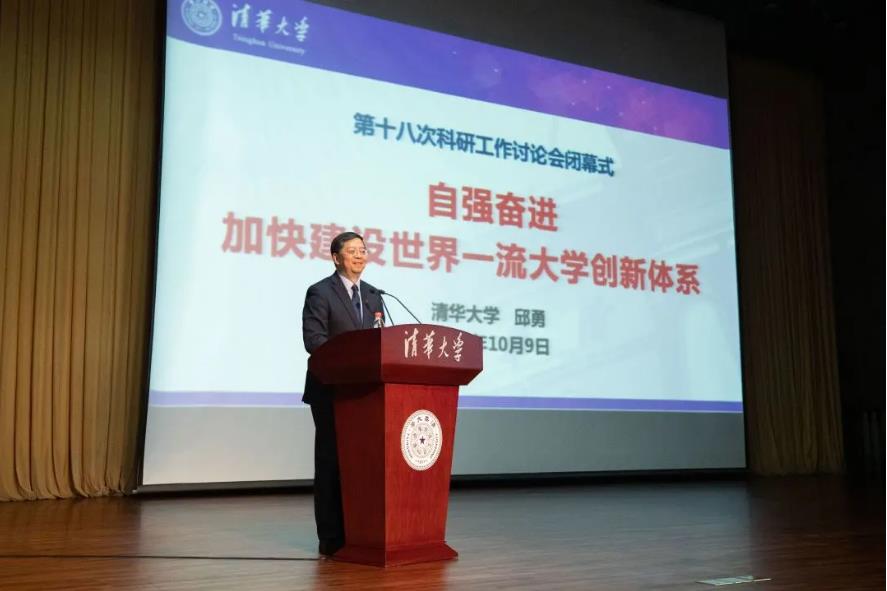“The competence to innovate is a core strength of a university. There is no world-class university without world-class innovation competence. Universities should lead through innovation, support national development with first-class innovation achievements, and build a world-class innovation system,” said President Qiu at the Closing Ceremony for the 18th Symposium on Scientific Research taking place both online and offline on October 9th.

According to President Qiu, Tsinghua will accelerate the pace to build a world-class university innovation system. As an academic institution, the university was born to cultivate talents and take academic pursuit as its responsibility. Integration of research and education is the core philosophy of universities and an important guarantee for cultivating top innovative talents. Without high-level academic research, it is impossible to cultivate high-level innovative talents and to better serve social development.
The theme of this year’s symposium is “Innovate research model to build a world-class university innovation system”. Launched in March, it lasted for six months and went through three stages: the discussion of problems, the presentation of reports and the conclusion.
Eight topics
Eight topics were discussed at the symposium: the development of academic ecology and academic community, the discipline development plan and discipline adjustment mechanism, the layout of fundamental frontiers and key core technologies, the construction of major innovation platforms and research teams, new industry-university-research cooperation and mechanism for the transformation of scientific and technological achievements, global innovation cooperation, integration of research and education and cultivation of innovative talents, and the construction of a world-class university innovation system.
Highlights and Achievements
Notable achievements have been made since the 17th Symposium on Scientific Research, including the improvements in the development of disciplines, academic level and innovation capabilities, which are reflected in the constant improvement in the quality of academic papers published, the increase of the national awards in science and technology, the construction of leading national key laboratories, the transformation of scientific and technological achievements and the new developments in the liberal arts. A new think tank system has been established to provide intellectual support for addressing national and global problems. A comprehensive discipline layout covering 11 disciplines has been completed, leading scientific research in China.
Next steps
Despite the remarkable results achieved in the reform of research over the past years, current research work still faces a series of problems and challenges. Going forward, Tsinghua will take further steps to strengthen the academic community construction to create a first-class academic ecology and academic culture, improve the layout of disciplines, further promote interdisciplinary development, strengthen the long-term and stable support for fundamental research, deepen the pilot reform of national key laboratories, build a high level of full-time research team, promote the integration of research and education, improve the mechanism for transforming scientific research achievements, take an active part in international scientific projects, and accelerate the pace to build an innovation system for world-class universities.
Initiated in 1956, altogether 18 symposiums on Scientific Research have been held up to this year and it has become a tradition to advance scientific research work at Tsinghua.
Writer: Guo Lili
Editor: John Olbrich

